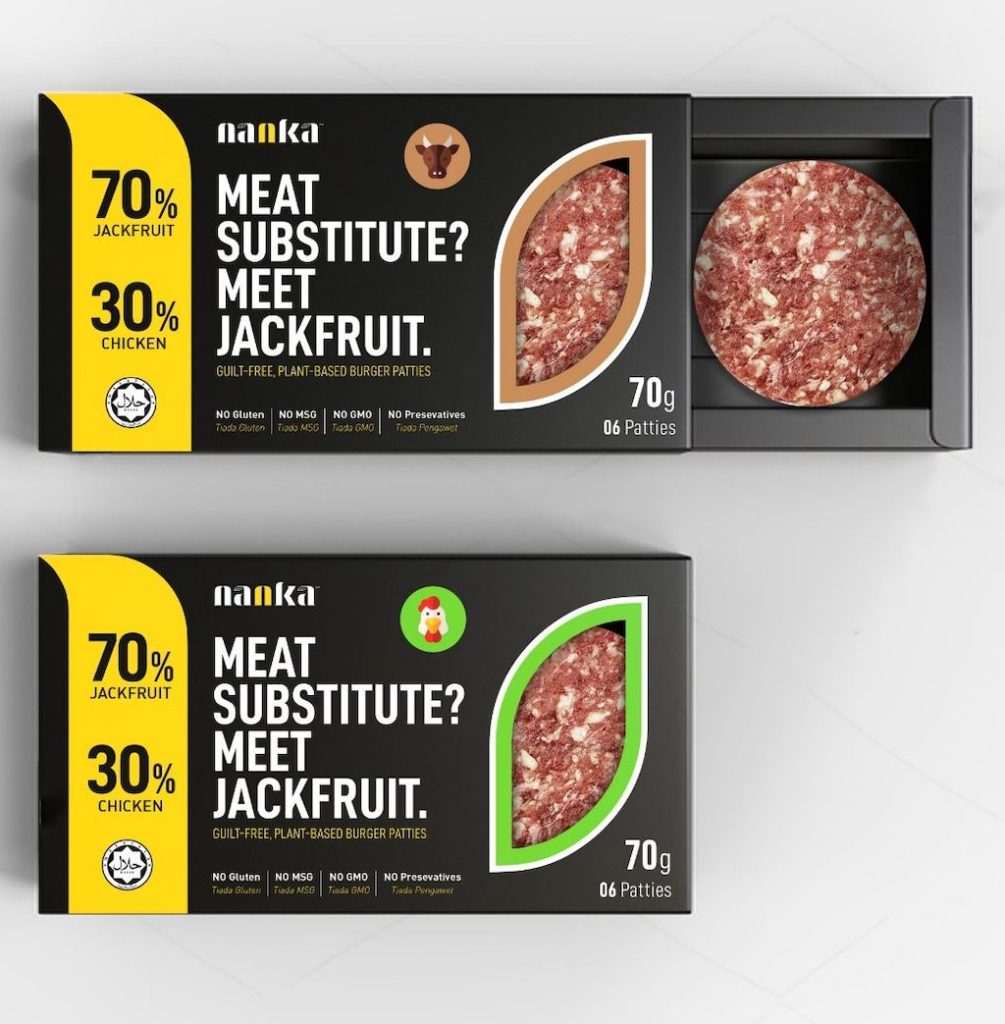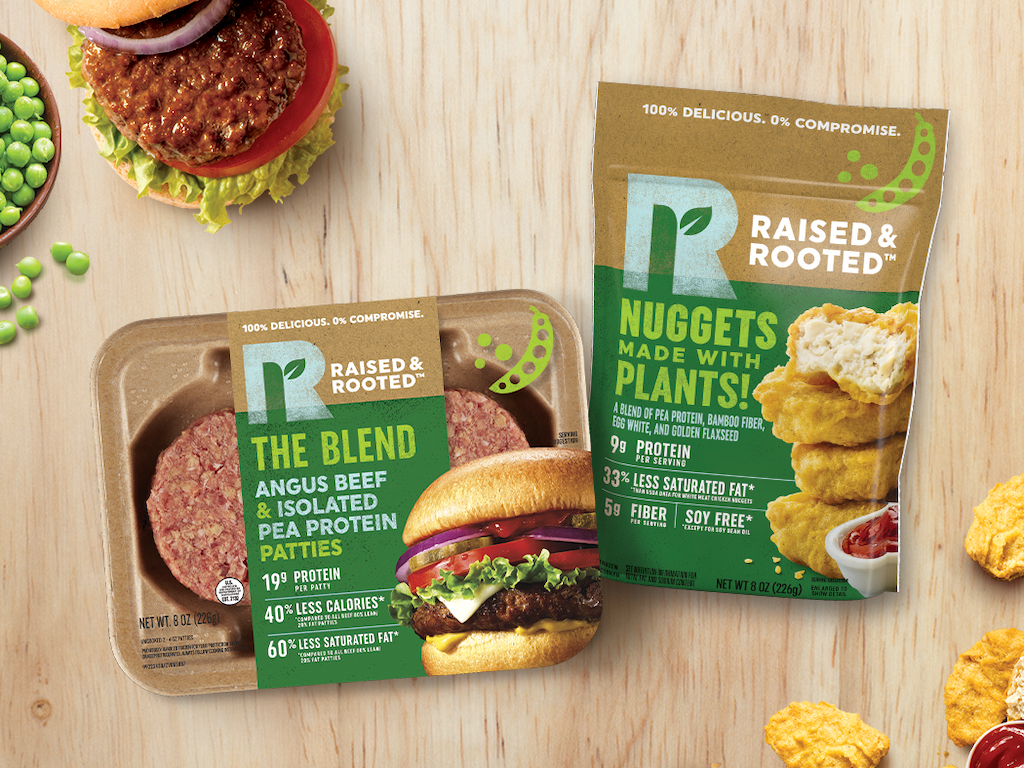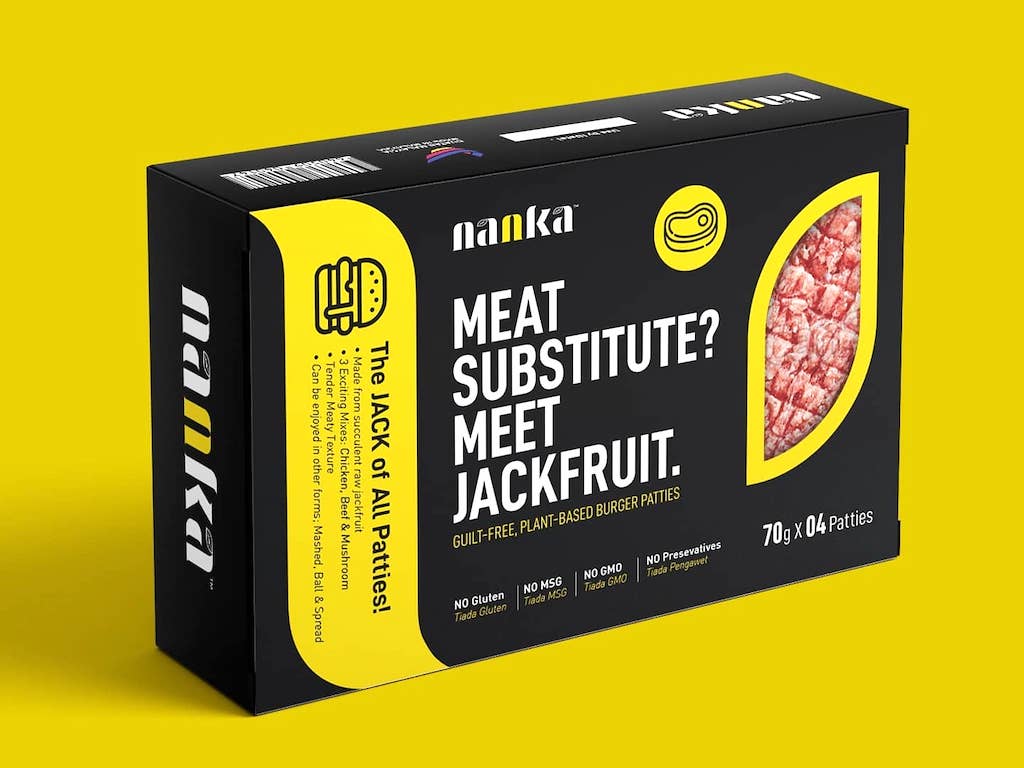6 Mins Read
Jackfruit is all the rage right now, with herbivores and the plant-curious alike dubbing it the perfect natural vegan substitute for everything from pulled pork burgers to meaty stews. But one startup, based in Malaysia, believes meat-loving consumers will be a little more convinced if they add the real deal in. The brand, Nanka, is offering one 100% vegan jackfruit patty along with two “blended” product. Will it take off or just simply confuse consumers?
Nanka is the latest brand to join Asia’s growing alt-protein scene. It launched just this month, the brainchild of Ira Noah, a Malaysian food tech company founded by Amirah Mohd Noh and Ahmad Syafik Jaafar. Using regionally abundant young jackfruit sourced from the country’s Pahang region, Nanka has developed three alt-meat patties—one is vegan, but the other two are not.
Blended jackfruit-chicken and beef patties

The first product is 100% plant-based, made from jackfruit, mushrooms, potato flour and textured vegetable protein. It’s free from GMOs, gluten synthetic flavourings and preservatives. The other two are also gluten-free and non-GMO, but they’re not meat-free.
Instead, they’ve been formulated with a blend of either 30% chicken and 70% jackfruit, or 30% beef and 70% jackfruit.
For the founders of Nanka, the whole idea is to offer consumers a high-fibre alternative to 100% meat products, with all of their patties—vegan or not—boasting anywhere between 8 to 10 grams of plant-based dietary fibre per serving, thanks to the use of jackfruit. The brand says it’s directly addressing the gap between the recommended fibre intake of 20 to 30 grams a day, and the mere 10 to 15 grams in the average Malaysian diet.
“Our intention right from the get-go is to encourage fellow Malaysians to eat a healthier diet, which means reducing meat as well as avoiding highly-processed fast food,” said Jaafar. “Our target market is the meat-eaters and the mixed meat versions are there to prepare them to phase out the meat intake with the psychology of ‘if you still want to eat meat, at least try to eat less’.”
Read: 5 vegan jackfruit brands to add to your plant-based grocery list

Not a low-carbon alternative, but a lower carbon one?
By virtue of being 100% made from plant ingredients, the brand’s vegan jackfruit and mushroom patty is by far the most sustainable product in Nanka’s range. Animal agriculture drives nearly a fifth of the world’s GHG emissions, and is a major contributor to deforestation, water pollution and soil erosion.
But the other two blended products that contain animal meat, albeit in smaller amounts compared to a real 100% meat patty, simply means that it’s still using ingredients that are contributing enormously to global food emissions. In particular, one uses beef—one of the most carbon-intensive foods in the food system, primarily due to the high amounts of methane that cows emit.
It is true, however, that removing a portion of the real animal meat needed to formulate a regular patty would mean a patty with a reduced carbon footprint.

The founders of Nanka are mostly focused on the health concerns of consumers, especially shoppers in Asia who often cite nutrition, immunity and food safety among their top concerns when it comes to their food choices. Besides aiming to reduce meat consumption among meat-lovers who are striving to eat better, Syafik says that “working mothers who are very conscious of their family’s health are our targeted customers too”.
Syafik went on to describe the coronavirus-induced trend of eating cleaner and cooking at home more, and that Nanka is closing this market gap by offering its blended jackfruit and meat patties. “[Consumers now] tend to cook more at home, and prefer a food source that is wholesome, without preservatives, colouring and flavouring.”
Will blended meat take off—or will it just confuse consumers?
Nanka plans to bring its blended meat products to more countries across Asia, including Japan, Singapore, India, and even Australia. It also says it will be aiming to expand its range with nuggets, “vegeballs”, hotdogs, mince and plant-based dairy products like butter and eggs—though it is unclear whether these analogues will be 100% vegan or not.
The brand isn’t the only company that has formulated products containing both meat and vegan protein, with the most famous example being Tyson-owned Raised & Rooted. But soon after launching its blended beef and pea protein burger and pea protein and egg white nuggets, it became pretty clear that consumers weren’t exactly thrilled with the idea. While it excluded vegans and vegetarians from buying the product, omnivores were perhaps left a little confused.

In a bid to boost sales, Tyson recently revamped the brand to ditch all animal meat and animal-derived proteins from its ingredient list. It dropped any traces of beef and egg whites, and now offers a full range of 100% vegan chicken nuggets, tenders and burger patties.
It was all too clear for Raised & Rooted that 100% plant-based products were the way to go—and flexitarians didn’t want blended products, they wanted vegan ones. Retail sales in the U.S. for vegan food topped $7 billion for the first time in 2020, and if consumer polls are any indication, a whopping 92% of shoppers who bought vegan meat for the first time say they plan on continuing to do so in the future.
Asia is a different market. It’s true that consumers are far more interested in the health aspect when it comes to food choices, over ethical or environmental concerns, and the launch of blended products could capture some shoppers who are just beginning to tap into the flexitarian trend. But it also risks confusing consumers, and could be a set back for 100% plant-based meat brands that are gaining traction in the region, such as the popular vegan pork mince OmniPork or Singapore’s plant-based chicken Tindle.
So far though, it appears that Asian consumers—even mainstream meat lovers—are convinced by 100% vegan proteins. According to a DuPont-Ipsos study, demand for plant-based meat in key Asian markets like Thailand and China are poised to skyrocket by 200% over the next five years, driven by health, but also the rising awareness of sustainability and animal welfare.
The research also found that more than three-quarters of Asian consumers (78%) now believe that plant-based meats are “here to stay” and that the trend will continue to last into the long-term.
Lead image courtesy of Nanka.




